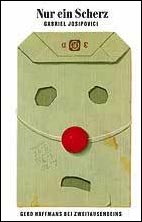
Gabriel Josipovici, 65, is a virtuoso at weaving a plot of comic-criminal dealings. The story advances almost exclusively in dialogue so the curious reader will inevitably turn from spectator to accomplice -- at the risk of being duped himself. Just like the Dadaist Walter Serner (1889-1942) once, in his gangster dramolettes, staged battles of dialogue touching off real fireworks within a minimum of space, Josipovici -- a Briton with s Jewish-Levant-Russian background -- touches off a play of intrigue with all against all, producing a maelstrom no one will be able to escape -- and all this transformed into a brilliantly laconic German by his friend Gerd Haffmans. Even the showdown moves on the heights of his great model: in crime fiction the law's revenge normally presides over the action, but here the gangsters' fatal proximity to each other is sufficient to make clear who outmaneuvered whom in the end. In a video art exhibition at the end, when suddenly the scene of evidence flickers over the screen, the reader has also grasped, how very sophisticatedly Josipovici has led him astray -- and then it is this very reader who wishes that a few more German narrators would write such light, marvelously precise, and entertaining prose.